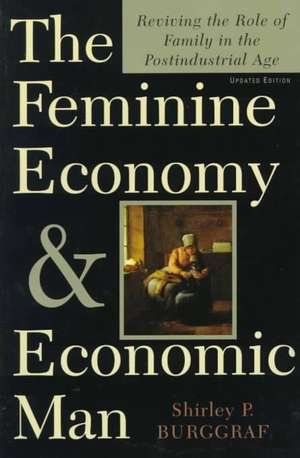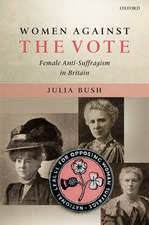The Feminine Economy And Economic Man: Reviving The Role Of Family In The Postindustrial Age
Autor Shirley Burggrafen Limba Engleză Paperback – 29 dec 1998
We
hear
much
talk
about
“family
values,”
but
what
“value”
do
we
actually
place
on
the
family
itself?
In
Postindustrial
America
is
the
family
merely
a
moral
and
sentimental
“worthy
cause?”
Or
is
it
in
fact
the
focus
of
some
of
society's
most
important
work—the
development
of
productive
workers
and
citizens—and
thus
one
of
the
primary
engines
of
economic
growth?InThe
Feminine
Economy
and
Economic
Man,
Shirley
Burggraf
sets
the
record
straight
about
the
true
value—and
true
cost—of
the
family's
work
in
nurturing
and
protecting
society's
“human
capital.”
With
startling
insight
she
also
shows
why
we
must
replace
our
“charity”
attitude
toward
family
with
something
more
appropriate,
the
same
model
we
use
for
encouraging
other,
important
economic
entities—the
model
of
investment
and
incentives.Economists
have
always
referred
to
an
inevitable
“next
generation”
of
workers
who
will
expand
the
GNP,
pay
off
the
national
debt,
and
support
the
social
security
system.
Yet
until
now
economic
thinkers,
predominantly
male,
have
never
factored
into
their
equations
the
investment
in
time,
labor,
and
opportunity
cost
actually
required
to
rear
those
children
into
productive
maturity.
It
was
as
if
the
next
generation
arose
magically
on
its
own
when,
in
fact,
the
economically
important
work
of
caretaking
was
being
performed
all
the
while
by
an
invisible,
unpaid
labor
force
called
women.But
now,
with
expanded
opportunities
available,
women
no
longer
volunteer
to
nurture
and
educate
the
young,
or
to
take
care
of
the
sick
and
dying,
for
submarket
wages
or
for
no
wages
at
all.
A
huge
transfer
of
labor
has
taken
place
from
the
Feminine
Economy
of
caregiving
into
the
market-driven
world
of
Economic
Man,
but
economists,
persisting
in
their
blind
spot,
have
yet
to
recognize
the
full
impact
of
the
shift.
Thirty
years
after
this
free
or
underpriced
labor
force
began
to
disappear
we
see
our
social
structure
fraying
at
the
seams,
and
we
wonder
why.The
answer,
clearly,
is
not
to
send
women
back
home,
nor
is
it
for
paternalistic
government
to
try
to
displace
the
family
entirely
and
take
over
every
caretaking
function.
The
answer
is
insightful
public
policy
that
insures
that
those
who
invest
most
in
producing
our
economy's
human
capital—the
parents,
the
teachers,
the
caregivers—be
rewarded
with
real
economic
incentives
rather
than
lip
service
and
platitudes.A
parent's
dividend
through
social
security,
dramatic
revision
of
our
divorce
laws,
and
a
parent-driven
approach
to
public
education
are
just
a
few
of
the
provocative
ideas
Shirley
Burggraf
offers
for
bringing
the
family
back
into
the
center
of
this
vital
economic
function.
Both
in
its
analysis
and
in
its
recommendations,
this
is
a
book
certain
to
spark
heated
debate.
Preț: 130.63 lei
Nou
Puncte Express: 196
Preț estimativ în valută:
24.100€ • 26.17$ • 20.68£
24.100€ • 26.17$ • 20.68£
Carte disponibilă
Livrare economică 15-29 martie
Preluare comenzi: 021 569.72.76
Specificații
ISBN-13: 9780738200361
ISBN-10: 0738200360
Pagini: 304
Dimensiuni: 155 x 234 x 21 mm
Greutate: 0.43 kg
Editura: BASIC BOOKS
Colecția Basic Books
ISBN-10: 0738200360
Pagini: 304
Dimensiuni: 155 x 234 x 21 mm
Greutate: 0.43 kg
Editura: BASIC BOOKS
Colecția Basic Books
Notă biografică
Shirley
P.
Burggraf,
Ph.D.a
recent
Bunting
Fellow
at
Radcliffe
College,
teaches
economics
at
Florida
A&M
University
in
Tallahassee.
















